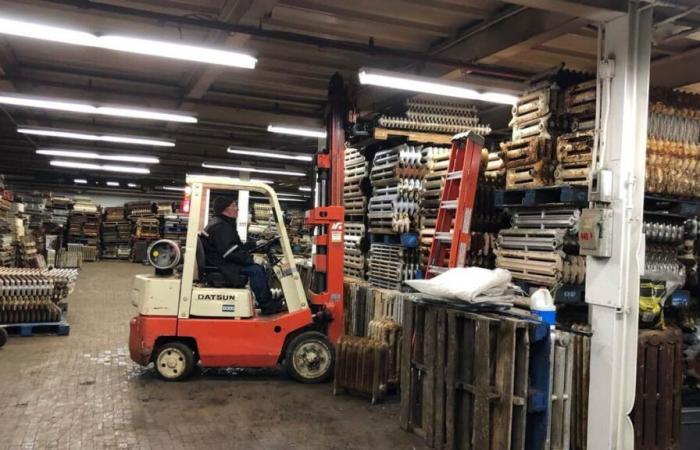The threat of rising American tariffs on Canadian goods is a hard blow for several Quebec companies that export to the United States or were planning to make a place there.
“It creates a lot of stress. We have been working hard for a long time to develop the American market, and then we wonder if it will have been a failure in the future,” laments the general director of Ecorad, Patricia Cloutier, in an interview with The Journal.
The small company that specializes in restoring old cast iron radiators bought a business south of the border in 2017 and opened a warehouse in Connecticut, in addition to investing in marketing and training to try to “break into the market American”.
The general director of Ecorad, Patricia Cloutier.
Photo provided by ECORAD
All these efforts could be wiped out if the American administration went ahead and imposed tariffs of 25% on all products coming from Canada, as Donald Trump announced he wanted to do after his inauguration in January.
“It will favor my competitors, because I will have to increase my prices. We will have to think of a strategy to remain competitive,” muses Mme Cloutier.
“And if after all our efforts, there is no result, or we find ourselves forced to postpone everything… it’s quite discouraging,” she adds. “Plus, I just saw that the Canadian dollar has crashed…”
“A disaster”
In Sainte-Marie-de-Beauce, the Beauce Atlas company, which manufactures 35,000 tonnes of steel annually, has been experiencing “a shock wave” since Monday. The company, which has three factories, all in the Chaudière-Appalaches region, exports 90% of its production across the border.
“Trump’s announcement is a disaster for us! We are still wondering if this is something that will happen on January 20, but what was announced is still important,” laments Nicolas Blais, general manager and vice-president of sales.
The entrepreneur says he received calls from four clients in Boston and New York in the space of a few hours Tuesday morning.
“They wanted to know what it was! We have contracts which stipulate that at the time of signing all prices are known and that future additional prices imposed would be the responsibility of the customer, but there are 66% of our contracts for which this is not the case. , he concludes.
Plan ahead
For the company Fredac Corporation, which works in steel and which has three factories in Quebec, namely in Laval, Montérégie and Centre-du-Québec, plans to open a factory in the United States were obvious from the start of Donald Trump’s electoral campaign.
“We’ve been thinking and working for six months to open a factory in Plattsburgh and let’s say that at this moment I don’t regret it, we were planning it,” explains Frédéric Albert, owner of Fredac Corporation.
The entrepreneur estimates that 50% of the company’s production of waste and cardboard compactors is exported to the United States and that an increase in customs tariffs would be impossible to manage.
“I don’t see how Canada can continue to export with a 25% tax, it’s impossible, we don’t have the margin […]again, we will have to wait to see what the response of our governments will be,” he adds.
Concerns
In fact, Donald Trump’s shock announcement worries many Quebec companies that export goods to the United States.
Several of them have even started to transfer goods to warehouses on the other side of the border, to avoid having to pay tariffs, testifies Daniel Bérard, CEO of the transport company DFS.
“Last week, there was already a sign that Trump was going to announce a tariff increase. We immediately saw the market become active, and we are currently transferring a lot of loads from Quebec to American warehouses,” he explains in an interview.
“Companies that are used to making weekly shipments send everything they can at once to the American side before being hit by tariffs,” adds Mr. Bérard.
Front uni
On the side of the Canadian Federation of Independent Business (CFIB), we fear the “major economic impact” that a disruption in the movement of Canadian goods to the United States would have.
“Canada must take Trump’s statement very seriously and present a united front to respond to this challenge. The uncertainty surrounding the issue of customs tariffs will put pressure on Canadian SMEs and could change their growth plans,” the organization warned in a press release.
“Businesses expect the worst, but hope for the best. There are certain companies that want to open factories in the United States to avoid customs tariffs,” underlines Victoria Drolet, senior advisor to the Conseil du Patronat du Québec.
– With the collaboration of Mathieu Boulay
Do you have any information to share with us about this story?
Write to us at or call us directly at 1 800-63SCOOP.






